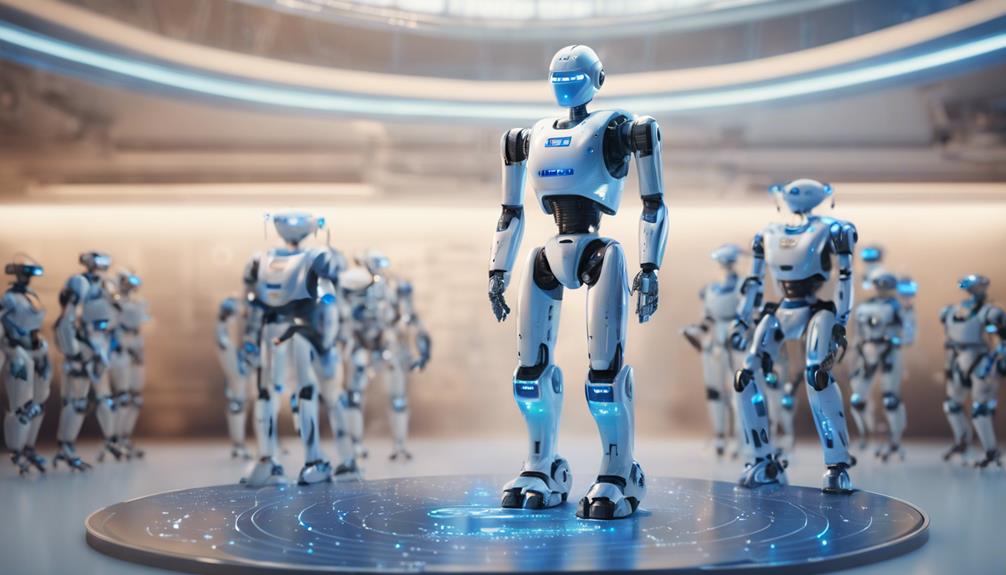
You're right to wonder which company will win the AI race, as it's a tight competition among major players. IBM's diving deep with quantum computing, aiming to tackle complex problems faster than ever. Google's DeepMind continuously revolutionizes fields like biomedicine with innovations like AlphaFold. Meanwhile, Amazon and Microsoft are embedding AI into your daily life through Alexa and Azure, making interactions seamless. Each giant is pushing boundaries, integrating AI to transform industries and everyday experiences. The leader will be the one who best integrates these technologies broadly and deeply. There's much more to uncover about how each contender plans to clinch the title.
The Contenders Overview

Several tech giants are leading the charge in the AI race, each with unique strategies and innovations. You've probably heard of IBM with its Watson, a system that's been around since beating human contestants on *Jeopardy!* Watson now focuses on enterprise solutions, helping businesses make smarter decisions.
Then there's Microsoft, harnessing the power of its Azure AI platform. They're integrating AI across cloud computing, which allows them to provide powerful analytics and cognitive services to a vast customer base. It's not just about enhancing their products; they're aiming to democratize AI access, making it available to developers at all levels.
Amazon, with its AWS and Alexa, is also a key player. They're pushing AI in every direction, from enhancing consumer experiences through Alexa's voice interactions to offering sophisticated machine learning services via AWS. This accessibility to machine learning tools is transforming how companies, big and small, leverage AI.
While these companies deploy AI in diverse fields, from healthcare to finance, they all share a common goal: to weave AI deeply into the fabric of everyday life.
You're witnessing a race not just for innovation, but for integration and influence across global markets.
Google's DeepMind Innovations
Google's DeepMind has revolutionized AI with groundbreaking achievements in algorithmic advancements. You've likely heard about AlphaGo, the program that famously defeated the world champion in the complex board game Go. This was a pivotal moment in AI, showing that machine learning could tackle tasks previously thought to require human intuition.
DeepMind's work doesn't stop at games. They're tackling real-world problems, such as protein folding with AlphaFold. You might find it fascinating that AlphaFold can predict the 3D shapes of proteins accurately, which is crucial for understanding diseases and developing new treatments. This tool has opened up possibilities in biomedicine that were once deemed years away.
Their AI also extends to improving energy efficiency in data centers, reducing cooling costs significantly. Imagine the impact of such technology on environmental sustainability. It's not just about cutting costs; it's about reducing carbon footprints, making a real difference in the fight against climate change.
You can see why DeepMind stands out in the AI race. Each innovation isn't just a technical win; it's a step towards solving some of the most pressing challenges faced by humanity today.
IBM's Quantum Leap

IBM is making significant strides in quantum computing, aiming to revolutionize how we solve complex problems. You might wonder how this impacts you directly. Well, imagine tackling issues like climate change or complex financial modeling—areas where traditional computers drag their feet. This isn't just about speed; it's about approaching problems in a fundamentally new way.
Quantum computing operates on the principles of quantum mechanics, where bits aren't just 0s or 1s, but can exist in multiple states simultaneously. This allows IBM's quantum computers to process vast amounts of possibilities in a fraction of the time it takes current supercomputers. Imagine you're working with a maze; while a traditional computer would explore each path sequentially, a quantum computer can analyze all paths at once.
IBM isn't keeping these advancements to itself. They've launched an initiative to bring this technology closer to you by partnering with businesses and academic institutions, ensuring that the benefits of quantum computing spread widely and are integrated into the real world. They're not just racing against other tech giants; they're racing towards a future where quantum computing is part of everyday problem-solving.
Amazon's Alexa Expansion
Amazon is rapidly expanding its Alexa technology into new markets, aiming to integrate deeper into your daily life. You're already familiar with Alexa's voice in your living room, but imagine her assisting in your car, managing your home security, or even guiding you through a workout. It's all part of Amazon's plan to make Alexa an indispensable companion.
The tech giant isn't just stopping at typical consumer devices. They're pushing Alexa into healthcare, where she can remind you to take your medicine or schedule your doctor's appointments. Imagine a scenario where you're cooking and can ask Alexa for a recipe adjustment based on what's in your fridge. This level of integration aims to make your daily tasks simpler and more intuitive.
Moreover, Amazon is enhancing Alexa's AI to understand and predict your needs better. The smarter she gets, the more you'll find her assistance invaluable.
Amazon's strategy is clear: weave Alexa so seamlessly into your life that interacting with her becomes as habitual as using your smartphone. As you adopt more of these AI-driven solutions, you'll likely find yourself relying on Alexa more and more, making her a central figure in your digital world.
Microsoft's AI Frameworks

Microsoft's AI frameworks are revolutionizing how you interact with technology, enhancing both personal and professional environments. Their suite of tools, such as Azure AI, offers you powerful cloud computing integrations that streamline complex data analysis and machine learning tasks. You're now empowered to build and deploy AI solutions that are more scalable and accessible than ever before.
You might've noticed how AI is seamlessly integrated into products you use daily. From Microsoft 365's smart editing features to Windows' advanced security protocols, AI is behind the scenes, making your experience smoother and safer. It's not just about user convenience; it's also about enabling you to achieve more with less effort.
For developers, Microsoft provides a robust platform with services like Azure Machine Learning and Azure Cognitive Services. You're equipped with the tools to create bespoke AI applications that can understand speech, recognize images, and make decisions with minimal human input. These capabilities are critical as businesses demand more intelligent and automated systems.
As you look toward the future, Microsoft's commitment to accessible AI through ethical frameworks and comprehensive education programs ensures that you're not just using AI but also understanding its impact. This commitment helps you navigate the complexities of AI responsibly and effectively.
Apple's Secretive AI Strategy
While Apple maintains a tight lid on its AI developments, you'll find their strategic investments subtly shaping the future of technology. Unlike their competitors, who often publicly tout their AI advancements, Apple's approach revolves around integrating AI seamlessly into devices you use every day, enhancing user experience without much fanfare.
You've probably noticed how Siri has evolved, becoming more responsive and intuitive with each update. Behind this improvement lies Apple's commitment to machine learning, a core component of their AI strategy. They're not just upgrading existing features; they're also pioneering new technologies. For instance, the processing chip in the latest iPhones includes a dedicated neural engine designed to handle AI tasks more efficiently.
Apple's focus isn't merely on hardware. They're also investing heavily in acquiring AI startups, bringing fresh talent and innovative technologies under their wing. This move isn't just about keeping their tech cutting-edge—it's about controlling the entire ecosystem, from the silicon up to the software.
You're witnessing a tech giant that operates with a clear vision for AI's role in the future. While they mightn't share much, their products speak volumes about their capabilities and intentions in the AI space.
Facebook's AI Ethics

Shifting focus to Facebook, the company faces significant scrutiny over how it handles AI ethics. You've probably noticed the headlines criticizing its approach to data privacy and algorithm transparency. It's crucial to understand that Facebook's AI systems influence what billions see online, shaping public opinion and even affecting elections.
You might wonder how Facebook is addressing these ethical concerns. The company has set up an AI ethics board, but critics argue that it's more about public relations than real change. They've introduced guidelines for ethical AI development, aiming to ensure that AI systems are built and used responsibly. However, the implementation of these guidelines often lacks transparency, making it hard for you to see if they're truly being followed.
Moreover, you're right to be concerned about bias in AI. Facebook has faced issues where their algorithms have inadvertently promoted bias, impacting everything from job ads to newsfeeds. The company claims it's working on improving AI fairness, but progress seems slow and uneven.
As you engage with Facebook, it's vital to keep these issues in mind. They're at the forefront of AI technology, but their ethical framework still needs significant work to match their technological advancements.
Chinese Giants: Baidu and Tencent
You'll find that Baidu and Tencent, two titans in China's tech landscape, are also making significant strides in the AI domain. Baidu, often hailed as China's Google, has embedded AI into its core operations, from autonomous driving solutions with its Apollo project to its Baidu Brain, which powers complex AI algorithms. Their investment in deep learning technologies and natural language processing helps them stay at the forefront of the AI innovation race.
Tencent, on the other hand, isn't lagging behind. It's leveraging AI across its vast ecosystem of social media, gaming, and cloud computing services. With AI integrated into popular platforms like WeChat, Tencent enhances user engagement through smart chatbots and personalized content recommendations. Moreover, their heavy investment in AI research centers and partnerships with academic institutions ensure they remain cutting-edge.
Both giants aren't just competing but also collaborating through shared initiatives like the AI Industry Alliance, aiming to set AI standards across China. This strategic move not only accelerates their own advancements but also positions them as global leaders in AI technology, directly impacting how you'll experience AI in everyday technology.
AI in European Markets

European companies are rapidly adopting AI to revolutionize industries ranging from automotive to healthcare. You're seeing a surge in AI-driven innovation as businesses strive to improve efficiency and develop new products and services.
For instance, in automotive, AI is being harnessed to enhance autonomous driving technologies. Meanwhile, healthcare firms are leveraging AI to personalize patient care and streamline diagnosis processes.
You can't overlook the role of startups in this landscape. They're pushing the boundaries, especially in AI ethics and sustainable AI solutions. These smaller entities often collaborate with larger corporations and governments to scale their impact, integrating advanced AI applications into everyday life.
Financial services in Europe are also getting a makeover with AI. You're witnessing banks and insurance companies deploying AI to detect fraud more effectively and automate customer service operations. This shift not only improves security but also boosts customer satisfaction by providing faster and more accurate responses.
European regulatory frameworks are adapting too. They aim to ensure that AI advancements don't compromise data privacy and security. You'll find that these regulations are fostering a trustworthy environment for AI adoption, reassuring both businesses and consumers about the benefits of this transformative technology.
Predicting the Future Leader
While it's challenging to predict which company will ultimately lead the AI race, several indicators suggest key contenders. You've got to look at their current technological advancements, market share, and strategic partnerships. Giants like Google and Microsoft are often in the spotlight, leveraging their extensive resources and ongoing research capabilities. They're not just developing AI; they're integrating it across a multitude of platforms, enhancing their ecosystems.
You should also consider the role of data accessibility. Companies with vast data reservoirs have a distinct edge, as AI systems improve with data. Amazon and Facebook, for instance, process enormous volumes of data daily, which might just tilt the scales in their favor.
Then there's the wildcard entries like OpenAI and other startups that are highly innovative and agile. They could leapfrog over the traditional tech giants with breakthroughs in AI technology. Keep an eye on how they manage scalability and commercialization, as these factors are crucial for taking the lead.
As you weigh these factors, think about where they intersect with global needs and ethical considerations. The leader of tomorrow's AI race won't just be technologically advanced but also aligned with broader societal values. Reflect on this as the landscape continues to evolve.
Frequently Asked Questions
How Does AI Impact Small Businesses Compared to Large Corporations?
AI impacts small businesses by offering cost-effective tools that level the playing field with large corporations, which have more resources to invest in advanced AI technologies, potentially boosting efficiency and competitiveness.
What AI Safety Regulations Are Currently in Place Globally?
You're asking about global AI safety regulations. Currently, they vary widely, with no universal standard. Each country sets its own rules, focusing on data protection, transparency, and accountability in AI systems' deployment and use.
How Does AI Influence Employment Trends in Traditional Industries?
AI reshapes how you work in traditional industries by automating routine tasks and demanding new skills. It's vital to adapt and upskill to remain competitive in an increasingly tech-driven job market.
What Are the Environmental Impacts of Increasing AI Technology Use?
As AI technology use increases, you'll see rising energy demands and electronic waste. However, AI can optimize energy use and reduce emissions, balancing its environmental footprint with its efficiency benefits.
How Do AI Advancements Affect Consumer Privacy Rights?
AI advancements increase surveillance and data collection, potentially compromising your privacy. As technology evolves, your personal information can be more exposed unless stringent privacy laws and ethical guidelines are implemented to protect you.
Conclusion
As you dive into the AI race, it's clear that each contender brings something unique to the table. Google's DeepMind pushes boundaries, IBM innovates with quantum tech, and Amazon expands Alexa's reach.
Microsoft and Facebook are shaping AI's framework and ethical use, while Baidu and Tencent dominate in China. Europe's presence can't be overlooked either.
Predicting the future leader isn't straightforward, but it's safe to say that the competition will drive incredible technological advancements.






